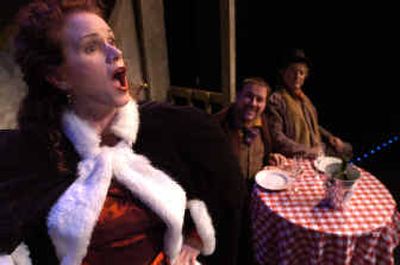An opera favorite

Giacomo Puccini’s “La Boheme” ranks as the most frequently performed opera. For many opera companies, large and small, it is the bread-and-butter production in much the same way “The Nutcracker” is for ballet companies.
Its popularity is easily explained. The story includes love and death along with spectacle and humor. Its music gives each major character at least one beautiful aria, and characters combine to sing some of Puccini’s finest ensembles. The orchestration is lavishly rich.
Besides, as great operas go, “Boheme” is among the shortest, at just under two hours of music.
Spokane-Coeur d’Alene Opera will present six performances of “La Boheme” beginning Saturday evening and continuing through May 14 at the Valley Performing Arts Center on the Central Valley High School campus.
It’s a new location for the group’s productions, which in the past have been downtown at The Met.
“This is a wonderful new theater,” says stage director Bill Graham. “It gives us more room in the wings on both sides of the stage and a fly loft from which we can fly in scenery.”
The opera company’s past productions also have been limited by a very small orchestra pit space. “For our ‘La Boheme’ this year,” Graham says, “we can expand our brass section and include harp, too.
“The luxury of this great new amount of stage space allows us to include a 23-member children’s chorus and a nine-member stage band in act two,” he adds. “I think this move to the Valley Performing Arts Center is a big, wonderful step for us.”
“La Boheme” takes its name from the bohemian area on the Left Bank in Paris where, in the 1830s, four starving artists and intellectuals are roommates.
A touching, ultimately tragic love develops between the poet Rodolfo and a neighbor, Mimi. Their affair is comically contrasted with that of the painter Marcello and his on-again, off-again mistress, Musetta.
Spokane-Coeur d’Alene Opera’s cast includes soprano Kerri Marcinko as Mimi, tenor Scott Ramsay as Rodolfo, soprano Leslie Mauldin as Musetta, baritone Randel Wagner as Marcello, Max Mendez as the musician Schaunard, and bass Joseph Rawley as the philosopher Colline.
Joseph Mechavich, who made his debut leading the company’s “L’Elisir d’amore” last season, will conduct.
“He was recently named music director of Opera Birmingham in Alabama,” Graham says. “Mechavich has conducted opera all over the country and also is noted for his work as a piano soloist and in chamber music.”
Marcinko is a graduate of Houston Grand Opera Studio and has sung roles in a wide variety of operas from Monteverdi’s “L’incoronazione di Poppea” to Tod Machover’s recent “Resurrection.”
Mauldin, who sang Micaela in Spokane-Coeur d’Alene Opera’s 2001 production of “Carmen,” is a Los Angeles native with an active career in film and television as well as being the founder of Boise’s Opera Etc.
Ramsay, who has sung with Lyric Opera of Chicago and Austin Lyric Opera, has among his credits a recent performance of Rodolfo with the Jacksonville (Fla.) Symphony led by former Spokane Symphony music director Fabio Mechetti.
Wagner teaches voice and heads the choral program at Eastern Washington University and has sung with the Spokane Symphony, the Northwest Bach Festival and in earlier Spokane-Coeur d’Alene Opera productions.
Mendez, who teaches voice at Gonzaga University and is music director at the Cathedral of Our Lady of Lourdes, is well known in Spokane for performances in most of the area’s classical music series as well as in musical theater productions.
Rawley, in his second season with Seattle Opera’s Young Artist Program, has sung in both Young Artist and mainstage productions there.
The opera will be sung in Italian with English supertitles.